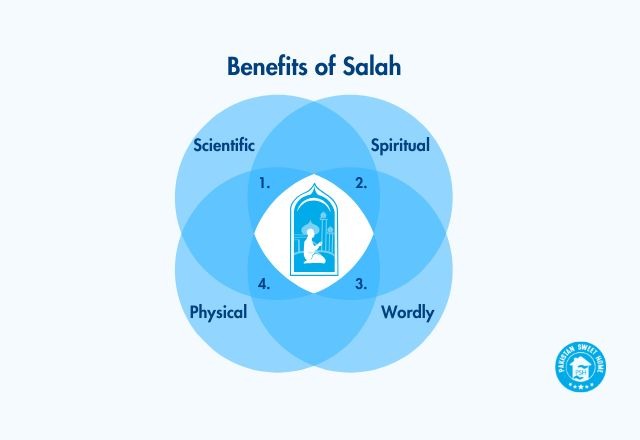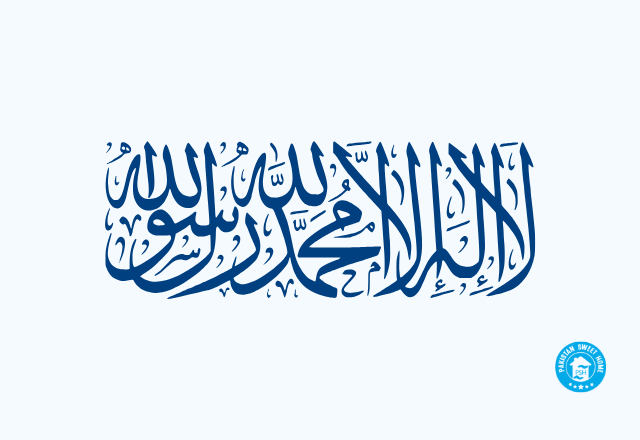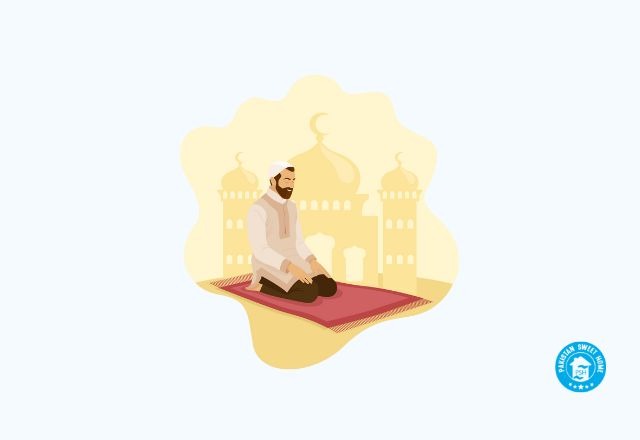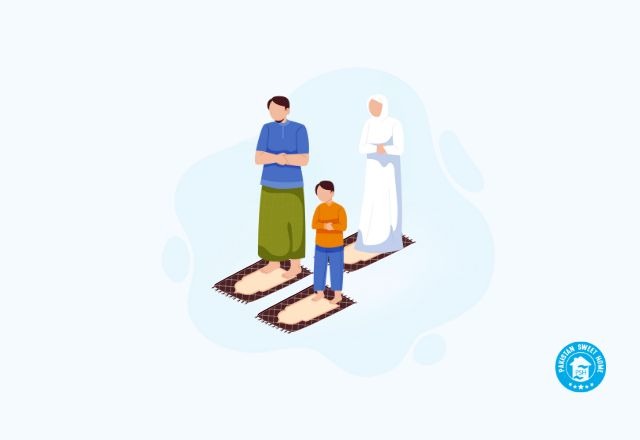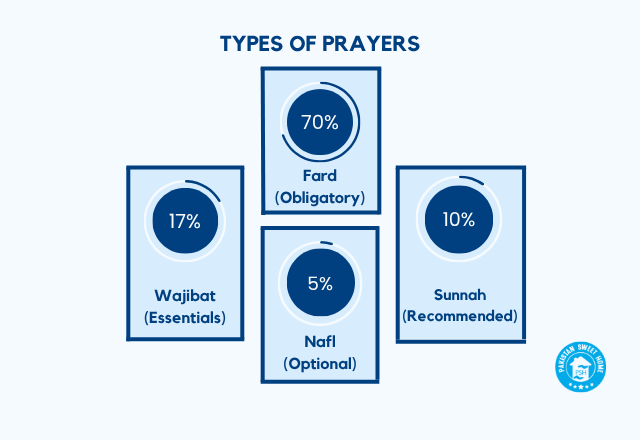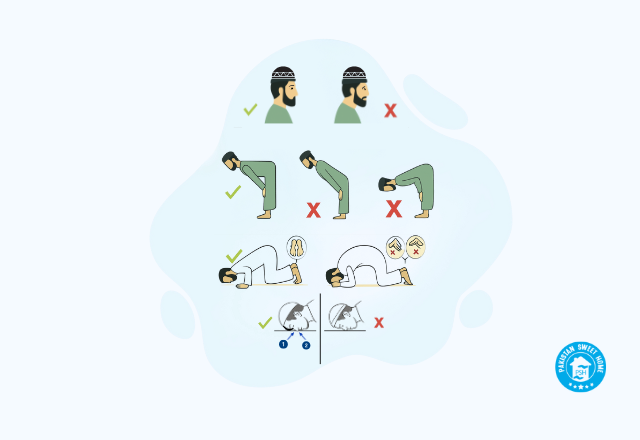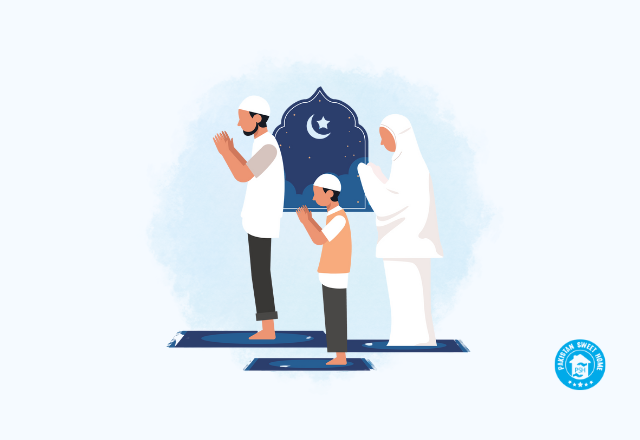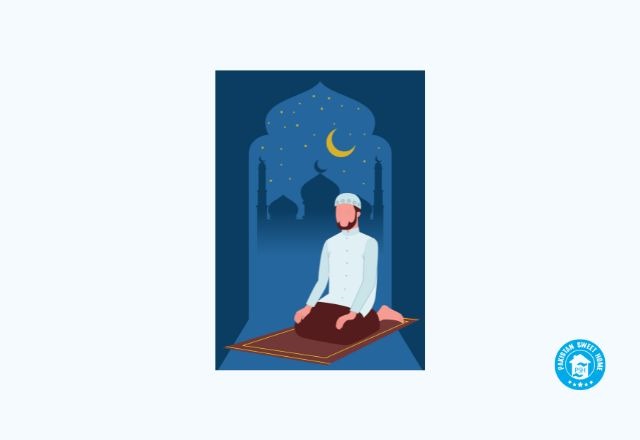Do you ever feel lost, anxious, or disconnected, even when everything in life seems fine?
We scroll endlessly, chase goals, and fill our days with noise, yet something inside still feels incomplete. The heart grows restless, weighed down by worries and the endless pull of worldly demands, searching for a calm it can’t seem to find.
That calm begins with Salah, the second pillar of Islam and a sacred pause that reconnects you with peace, clarity, and your Creator.
Let’s explore how Salah benefits transform our lives, bringing balance, strength, and serenity to the soul.
Spiritual Benefits of Salah
Here are the spiritual Salah benefits:
1. A Direct Connection with Allah Almighty
Salah is the believer’s daily audience with the King of all kings. It is a moment of intimate communication where one speaks directly to Allah without intermediaries. Through prayer, the heart unloads its burdens, and the soul reconnects with its Creator.
Allah reminds us:
يَـٰٓأَيُّهَا ٱلَّذِينَ ءَامَنُوا۟ ٱسْتَعِينُوا۟ بِٱلصَّبْرِ وَٱلصَّلَوٰةِ ۚ إِنَّ ٱللَّهَ مَعَ ٱلصَّـٰبِرِينَ
“O you who believe! Seek help through patience and prayer. Surely, Allah is with those who are patient.”
(Qur’an 2:153)
When we perform Salah, we are invited into the divine presence of Allah, a conversation in which He listens, forgives, and answers. This constant connection protects the heart from spiritual dryness and keeps faith alive even amid life’s chaos.
2. Strengthens Faith (Iman) and Builds Taqwa
Prayer nourishes the seed of faith planted in the believer’s heart. It reminds us that every blessing, every hardship, and every breath comes from Allah. Through Salah, we learn mindfulness (Taqwa), the awareness that Allah is watching over every action and intention.
ذَٰلِكَ ٱلْكِتَـٰبُ لَا رَيْبَ ۛ فِيهِ ۛ هُدًۭى لِّلْمُتَّقِينَ ٱلَّذِينَ يُؤْمِنُونَ بِٱلْغَيْبِ وَيُقِيمُونَ ٱلصَّلَوٰةَ وَمِمَّا رَزَقْنَـٰهُمْ يُنفِقُونَ
“This is the Scripture in which there is no doubt, a guidance for those who are mindful of Allah, those who believe in the unseen, establish prayer, and spend out of what We have provided for them.”
(Qur’an 2:2–3)
By performing Salah regularly and sincerely, one develops self-control, moral discipline, and gratitude, the pillars of a God-conscious life.
3. A Reminder of the Day of Reckoning
Standing before Allah five times a day reminds us of the greater standing to come, the Day when every soul will be judged. Salah humbles us and softens the heart, reminding us that this life is fleeting and accountability is certain.
When performed with sincerity, Salah nurtures humility, the realization that we are dependent on Allah for everything. This humility becomes the foundation for good character.
4. Strengthens the Heart and Expands the Chest
A heart connected to Allah is a heart full of light. Salah strengthens this connection, purifying the heart from arrogance and filling it with serenity.
Spiritually, it “expands the chest,” meaning it grants ease, patience, and clarity. When life feels suffocating, prayer opens the space for relief, granting both courage and insight.
5. Protects from Calamities
Regular prayer serves as a shield against trials and unseen harm. Allah’s mercy descends upon those who maintain Salah, safeguarding them from hardships and granting resilience in difficulty.
It doesn’t mean a believer will never face challenges, but Salah ensures that even in hardship, faith remains firm, and despair never settles in the heart.
6. Opens the Gates of Paradise
Salah is the key to Paradise. It is the first act of worship we’ll be held accountable for on the Day of Judgment. If our prayer is sound, all else will follow.
إِنَّ ٱلَّذِينَ ءَامَنُوا۟ وَعَمِلُوا۟ ٱلصَّـٰلِحَـٰتِ وَأَقَامُوا۟ ٱلصَّلَوٰةَ وَءَاتَوُا۟ ٱلزَّكَوٰةَ لَهُمْ أَجْرُهُمْ عِندَ رَبِّهِمْ وَلَا خَوْفٌ عَلَيْهِمْ وَلَا هُمْ يَحْزَنُونَ
“Those who believe, do good deeds, keep up the prayer, and pay the prescribed alms will have their reward with their Lord: no fear will there be concerning them, nor will they grieve.”
(Qur’an 2:277)
Guarding one’s Salah is, therefore, guarding one’s eternal home.
7. Deepens Gratitude and Reflection
Each prayer is an expression of gratitude, a pause from worldly chaos to thank Allah for His countless favors. Salah reminds us that every blessing is a trust and every moment a mercy.
Gratitude cultivated through prayer transforms how we see life; we begin to find beauty in trials, patience in loss, and joy in service.
8. Nourishment for the Soul
Ultimately, Salah nourishes the soul like rain revives the earth. It recharges faith, cleanses the heart, and fills life with meaning. When performed with khushu‘ (mindfulness), it transforms worry into hope and weakness into strength.
Salah is not a burden but a mercy, the believer’s sanctuary in every storm. It is where peace begins and where the journey to Allah never ends.
9. Salah as a Light and Guidance
In a world filled with temptations and distractions, Salah acts as a radiant light guiding us through uncertainty. Each prayer purifies the heart, clears the mind, and strengthens the believer’s moral compass.
This light does not end in this world. The Prophet (ﷺ) mentioned that on the Day of Resurrection, the faithful will rise with light shining before them, while others will stumble in darkness. Salah, therefore, is not only guidance for today but illumination for eternity.
10. A Shield Against Evil and Immorality
Salah protects the believer from sin, indecency, and wrongdoing. It purifies the heart and redirects the soul from the traps of desire.
ٱتْلُ مَآ أُوحِىَ إِلَيْكَ مِنَ ٱلْكِتَـٰبِ وَأَقِمِ ٱلصَّلَوٰةَ ۖ إِنَّ ٱلصَّلَوٰةَ تَنْهَىٰ عَنِ ٱلْفَحْشَآءِ وَٱلْمُنكَرِ ۗ وَلَذِكْرُ ٱللَّهِ أَكْبَرُ ۗ وَٱللَّهُ يَعْلَمُ مَا تَصْنَعُونَ
“Recite what has been revealed to you of the Scripture and establish prayer. Indeed, prayer restrains one from shameful and unjust deeds.”
(Qur’an 29:45)
When Salah is performed mindfully, not just mechanically, it builds a moral filter in the heart. The remembrance of Allah during prayer becomes a shield against lust, arrogance, and disobedience. Over time, this consistent act shapes a life of righteousness.
11. A Path to Forgiveness and Purification
Salah is a purifier of sins and mistakes. Every bow and prostration erases spiritual stains, bringing the believer closer to a clean heart.
The Prophet (ﷺ) beautifully said:
“If there was a river at the door of any one of you and he bathed in it five times each day, would there be any trace of dirt left on him?” They said: ‘No.’ He said: ‘That is the likeness of the five daily prayers. Allah erases sins through them.’”
(Sunan an-Nasa’i)
Just as water washes away dirt, prayer washes away sins. It’s Allah’s mercy in motion, a daily opportunity for renewal and redemption.
12. Protection from Shaytaan
Salah keeps the believer alert and guarded against the whispers of Shaytaan. When we neglect prayer, our spiritual shield weakens, allowing temptations to creep in.
إِنَّمَا يُرِيدُ ٱلشَّيْطَـٰنُ أَن يُوقِعَ بَيْنَكُمُ ٱلْعَدَٰوَةَ وَٱلْبَغْضَآءَ فِى ٱلْخَمْرِ وَٱلْمَيْسِرِ وَيَصُدَّكُمْ عَن ذِكْرِ ٱللَّهِ وَعَنِ ٱلصَّلَوٰةِ ۖ فَهَلْ أَنتُم مُّنتَهُونَ
“With intoxicants and gambling, Satan seeks only to incite enmity and hatred among you, and to stop you remembering Allah and prayer. Will you not give them up?”
(Qur’an 5:91)
Every time we stand for Salah, we defy Shaytaan’s plan and declare our loyalty to Allah alone. Regular prayer fortifies the heart, ensuring that evil cannot easily take root.
Physical Benefits of Salah
Here are the physical Salah benefits:
13. Improves Physical Health and Well-being
The physical movements of Salah, standing, bowing, and prostrating, engage nearly every muscle group, promoting flexibility, circulation, and joint strength.
Medical experts have found that regular prayer helps burn calories, improve posture, and reduce stress levels. The rhythmic movement and calm breathing help regulate the heart rate and strengthen the body while soothing the mind. Salah, in its beauty, unites worship with wellness.
14. Removes Laziness and Inactivity
When the believer rises for Fajr, fights drowsiness, and performs prayer, he conquers the self. Salah cultivates discipline and breaks the habit of procrastination.
It refreshes the body and mind, replacing sluggishness with motivation. That’s why those who pray regularly tend to feel more energized and purposeful, because prayer aligns their soul with divine rhythm.
Worldly Benefits of Salah
Here are the worldly Salah benefits:
15. Strengthens Discipline and Time Management
Prayer trains the believer to value time. Each Salah has its appointed hour, teaching punctuality, structure, and responsibility. When one organizes their day and night around prayer, life gains order and purpose.
فَإِذَا قَضَيْتُمُ ٱلصَّلَوٰةَ فَٱذْكُرُوا۟ ٱللَّهَ قِيَـٰمًۭا وَقُعُودًۭا وَعَلَىٰ جُنُوبِكُمْ ۚ فَإِذَا ٱطْمَأْنَنتُمْ فَأَقِيمُوا۟ ٱلصَّلَوٰةَ ۚ إِنَّ ٱلصَّلَوٰةَ كَانَتْ عَلَى ٱلْمُؤْمِنِينَ كِتَـٰبًۭا مَّوْقُوتًۭا
“Indeed, prayer has been decreed upon the believers at prescribed times.”
(Qur’an 4:103)
By honoring these times, we honor the balance Allah wants in our lives. This rhythm nurtures discipline, a skill that benefits every worldly and spiritual pursuit.
16. Fosters Equality and Brotherhood
In congregational Salah, every distinction, wealth, color, nationality, or rank, disappears. The king and the laborer stand shoulder to shoulder, equal before their Creator.
This powerful image of unity is unique to Islam. It reminds believers that honor comes not from status but from piety.
As the Prophet (ﷺ) said, “No Arab is superior to a non-Arab, nor a non-Arab to an Arab, except by Taqwa.”
17. Brings Blessings and Sustenance
Salah is a magnet for barakah (blessings). Through consistent prayer, Allah blesses our time, work, and relationships. Many believers testify that when they guard their Salah, life seems to flow more smoothly, and sustenance comes from unexpected places.
It’s not about the quantity of wealth but the quality of contentment that Salah brings. Each prayer is an invitation for divine mercy to enter our homes and hearts.
Scientific Benefits of Salah
Here are the scientific Salah benefits:
18. A Source of Peace and Emotional Relief
Every believer faces hardship, anxiety, and grief. Salah is Allah’s gift for inner peace, a therapy for the restless soul. In prayer, we unburden our hearts, trusting that Allah hears every whisper.
ٱلَّذِينَ ءَامَنُوا۟ وَتَطْمَئِنُّ قُلُوبُهُم بِذِكْرِ ٱللَّهِ ۗ أَلَا بِذِكْرِ ٱللَّهِ تَطْمَئِنُّ ٱلْقُلُوبُ
“Indeed, in the remembrance of Allah do hearts find rest.”
(Qur’an 13:28)
Many Muslims describe the act of sujood (prostration) as the moment they feel closest to Allah. It is where worries dissolve, and hope is renewed. The tranquility that follows sincere prayer is unmatched, a peace no wealth or status can buy.
19. Improves Brain Function and Focus
The repeated cycles of bowing, prostration, and recitation enhance blood flow to the brain, improving alertness, focus, and memory. Studies show the act of sujood increases oxygen supply to the frontal lobe, the brain’s center for decision-making and emotional control.
20. Balances the Nervous System
Salah’s rhythmic movement between standing, bowing, and prostrating improves neural coordination and activates both hemispheres of the brain. It promotes mind-body synchronization, similar to mindfulness meditation, proven to stabilize mood and emotion.
The following are some other scientific Salah benefits:
- Lowers Blood Pressure and Improves Circulation: Salah’s movements, especially sujood, enhance blood flow and help regulate blood pressure.
- Promotes Mental Clarity and Emotional Stability: Prayer calms the mind, reduces fatigue, and activates brain areas linked to empathy and self-control.
- Enhances Posture and Musculoskeletal Health: The physical positions of Salah strengthen muscles, align the spine, and ease joint stiffness.
- Improves Sleep Quality: Regular night prayers help balance the body’s sleep cycle and promote deeper, more restful sleep.
- Supports Metabolic and Digestive Health: Salah’s gentle movements boost digestion, prevent sluggishness, and burn calories naturally.
In conclusion, Salah is the foundation of a believer’s life. It disciplines the body, enlightens the mind, and purifies the heart. Every prostration is a reminder that true greatness lies in humility before the Creator.
Salah is the heartbeat of a believer’s life, a source of peace, discipline, and guidance. It strengthens faith, purifies the soul, and keeps the heart connected to Allah (SWT). Through prayer, we find forgiveness, patience, and the strength to face life’s trials. It protects us from sin, softens our character, and fills our hearts with light, gratitude, and contentment.
Salah nurtures both the body and soul, bringing calm to the mind and energy to the spirit. It unites the Ummah in equality, invites barakah into our lives, and reminds us of our purpose and accountability. In every bow and prostration, we find hope, healing, and closeness to Allah, the peace our hearts have always longed for.
At Pakistan Sweet Home, an orphanage home dedicated to nurturing and empowering orphaned children, the spirit of Salah is deeply woven into daily life. Here, young hearts are taught that true strength begins on the prayer mat, where they find peace, discipline, and a connection to Allah (SWT).

info@pakistansweethome.org.pk
(051) 4865856
+92 335 1118477



